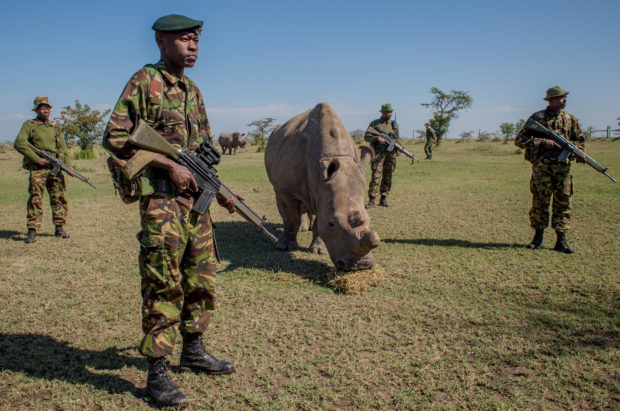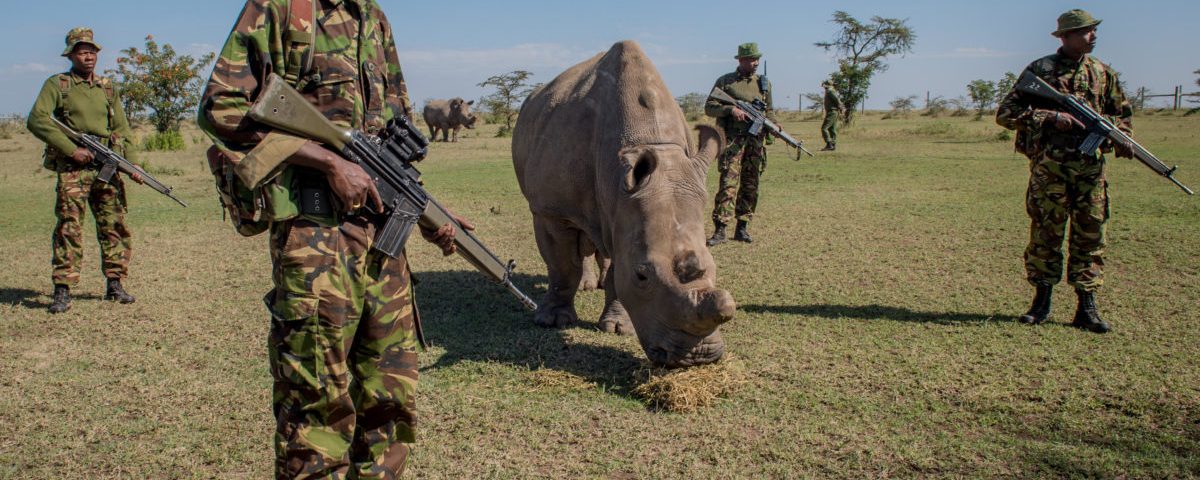It’s an alarming and revealing photo – a group of four game wardens in Kenya, guns in hand, surrounding a large adult male northern white rhino. That picture tells two stories: one revealing human avarice, but the other reminding us of human grace and resolve to stop the savage, serial killing of one of the rarest large mammals in the world.
Now, the story of avarice has revealed itself in a new, shocking way. This week, poachers slipped into the rhino enclosure at Thoiry Zoological Park outside Paris, shot the animal multiple times in the head, and made off with one of his horns. The field of battle has now expanded to captive zoo animals who had previously been viewed as safely ensconced behind the walls and bars of their enclosures.

Three rhinos are poached every day for their horns. Above, armed game wardens watch over an endangered northern white rhino at a nature conservancy in Kenya. Photo by Alamy
Just two weeks ago, poachers intent on making a profit broke into the Thula Thula Rhino Orphanage in South Africa. They took the tiny, soft horns from two baby rhinos after killing one and injuring the other so badly, she had to be euthanized later. The poachers also robbed and savagely attacked the rhinos’ caretakers.
We know these people have no decency. We must wonder now, do they also have no limits?
Last year, more than 1,000 rhinos fell victim to poachers in South Africa, where a majority of the world’s rhinos live. Three rhinos are poached every day for their horns. Only about 29,000 rhinos, of all five species, remain in the wild.
The international trade in horns is illegal under the Convention on International Trade in Endangered Species of Wild Fauna and Flora (CITES), and last year France banned the sale of raw rhino horn and elephant ivory.
But of all places, South Africa is backtracking and breaking the global consensus on what’s needed to save the rhinos. Just last month, the country proposed regulations that would legitimize and regularize domestic trade in—and, under certain circumstances, export of—rhinoceros horn. That move would give poachers even more incentive to do their killing, using the legal trade as a cloak for their poaching activities. Authorities would have before them the seemingly impossible task of being able to discern between legal and illegal horn in a country where rampant corruption has been cited by wildlife officers as a serious threat to their ability to do their job.
We’re fighting that proposal, but we are also working to slash demand in Vietnam, where horns have been prized by some for their purported medicinal value. Since 2013, Humane Society International has worked with the government of Vietnam on a national campaign to reduce demand for rhino horn. Our campaign has reached an estimated 35 million people, or about one-third of the national population. Tens of millions of people in Vietnam have seen our children’s book and cartoon called I’m a Little Rhino. Our campaign has been a big part of the explanation for the reduction in demand in the country. There are indications that the price of rhino horn has fallen very recently in Vietnam.
In Europe, Europol, the EU Agency that assists member states in fighting serious international crime and terrorism, and its member states will soon discuss the 2017 Serious and Organised Crime Threat Assessments (SOCTA). HSI is pushing for wildlife trafficking to be a priority issue for EU governments and their agencies. They should treat wildlife trafficking as a serious crime as identified under the United Nations Convention against Transnational Organized Crime.
Stateside, The HSUS is working to crack down on trafficking in wildlife products, including rhino horn, by banning their sale. A recent case shows the urgency of the fight here: a Beverly Hills auctioneer and reality TV star was indicted in Manhattan for allegedly conspiring to smuggle rhino horns in a years-long trafficking scheme. According to the indictment, as reported by NBC, Jacob Chait and his co-conspirators allegedly were involved in the dealing, or attempted dealing, of at least 15 rhino horns worth about $2.4 million between 2009 and 2012. In one case, Chait allegedly smuggled two endangered black rhino horns to China in his luggage.
This year, California, Hawaii, New York, New Jersey, Oregon and Washington have adopted measures to ban trade in rhino horn and elephant ivory. Legislation is pending in numerous other states, including Connecticut, Maryland, Massachusetts, Nebraska, and Nevada.
The killing of the rhino in a zoo near Paris is a reminder that we must redouble our efforts to curb a barbaric trade. We’ll be pressing on all fronts to defend the rhinos, and to bring the perpetrators of cruelty to wildlife to justice.
The post Ruthlessness of wildlife poaching and trafficking on display in Paris appeared first on A Humane Nation.
Enviroshop is maintained by dedicated NetSys Interactive Inc. owners & employees who generously contribute their time to maintenance & editing, web design, custom programming, & website hosting for Enviroshop.
